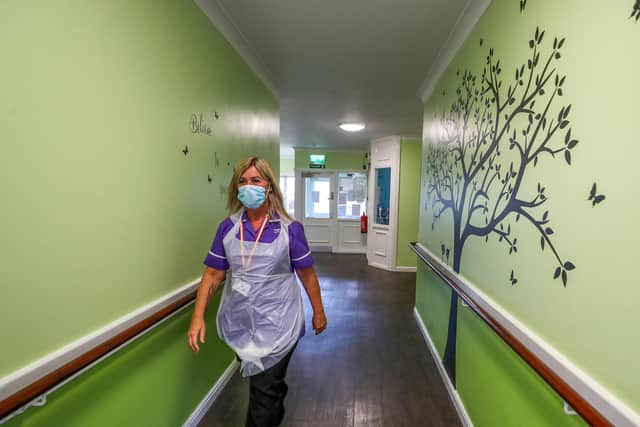Covid Scotland: Hospital patients 'refusing' discharge to care homes
Around 1,500 hospital beds in Scotland are filled by patients who could safely be discharged elsewhere, which causes delays and extra pressure in other areas such as accident-and-emergency departments.
In most cases this is prevented by a lack of available facilities in community care, but Mr Yousaf said some patients have been offered a funded place in a care home, but refused to take it up.
Advertisement
Hide AdAdvertisement
Hide AdSome 28 patients in Edinburgh have refused to be discharged, the health secretary told BBC’s Good Morning Scotland, despite being clinically safe to do so.


Asked what measures have been taken to protect care homes, Mr Yousaf said they are “absolutely safe”.
Donald Macaskill, chief executive of Scottish Care, reiterated that care homes are safe places. He said he would personally choose a care home over a hospital as a setting with a lower risk of Covid-19.
One reason for patients and families refusing discharge to care homes is the “machine of negativity” around the accommodation from politicians and the media, Mr Macaskill said.
“We have heard of people being very reticent about going into a care home,” he said.
He added: “I think this is in a sense us reaping the way in which care homes have been treated in the last 20 months.
“When I talk to colleagues elsewhere in the United Kingdom, we're not seeing the same negativity towards care homes.
“Families are obviously concerned about safety, but once they are talked to and reassured then they tend to take up a care home placement.
Advertisement
Hide AdAdvertisement
Hide Ad“But in Scotland, we have seen, uniquely in the United Kingdom, every single death in a care home being investigated by the Crown Office.
“That hasn't happened anywhere else. And what that has done is to create a toxic environment which has led to staff leaving the sector.
“Nurses, in particular of real experience, feel as if they're being victimised, and it has fed into the narrative that care homes are places which are unsafe.”
Edinburgh Health and Social Care Partnership said all those entering a care home would need to receive a negative PCR test and self-isolate for the first part of their stay. Visitors are allowed under Scottish Government guidance, they said.
“Given significant demands on healthcare services, we are working directly with those awaiting care and support – whether in the community or who are awaiting discharge from hospital – and their families, to remain open, honest, caring and pragmatic about what can be done to assist care needs,” the partnership said.
"Ensuring preferred care arrangements for individuals is ordinarily our priority, but these are not ordinary times. With very real shortages of staff, we need to work differently and offer other arrangements in order to support the most vulnerable.
“For those people we are unable to currently support with their care preference, we’re offering alternative, interim care home placements, matching people’s needs to the care home’s skill and environment. In every case, the safe pathways for an admission are adhered to at all times.”
A message from the Editor:
Thank you for reading this article. We're more reliant on your support than ever as the shift in consumer habits brought about by coronavirus impacts our advertisers.
If you haven't already, please consider supporting our trusted, fact-checked journalism by taking out a digital subscription.
Comments
Want to join the conversation? Please or to comment on this article.
